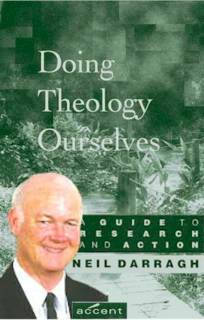 “Doing Theology Ourselves” is an introduction to theological reflection with a contextual approach, written by Neil Darragh in 1995. Darragh is a Catholic parish priest (Glen Innes, Auckland) and educator at the Catholic Institute of Theology, Auckland.
“Doing Theology Ourselves” is an introduction to theological reflection with a contextual approach, written by Neil Darragh in 1995. Darragh is a Catholic parish priest (Glen Innes, Auckland) and educator at the Catholic Institute of Theology, Auckland.
I have found Darragh’s approach helpful in identifying the need for awareness of local issues and their connection with the Christian tradition. He puts his finger on the frustration many have with academic theology – theologians talking with one another in inaccessible language, rather than doing theology with people in everyday ministry and mission contexts. Here Darragh takes the reader through a process of starting from significant action in the local context, identifying issues, pivotal questions and reading the scriptures in that light. No room here for proof texting though. He suggests reading through all of the New Testament when exploring new issues. There’s no use hiding the fact that contextual theology, that is done rather than received, is hard work.
As Darragh himself points out, his approach suits people with a literary individualist streak – people able to focus, read and write for long periods of time by themselves. I would add that it suits people who are able to talk about ‘issues’ for their community. There are major steps required to go from data through to abstract principles that can be applied back to concrete situations.
As a resource for responding to generational change
Darragh introduces the discipline of considering the local context from the perspective of action rather than books. Local leaders are invited to consider their experiences of ministry and mission. This is done in community, not alone. The most effective theological reflection on generational change is done by people who are engaging with one another as members of specific generations. The dialogue that leads to engagement with scripture together is a huge factor in developing integrity in appropriate styles. Assumptions can be aired and tested. Resources can be sought together. Long term study of the Scriptures can be engaged in with the pivotal questions relating to generational change.
